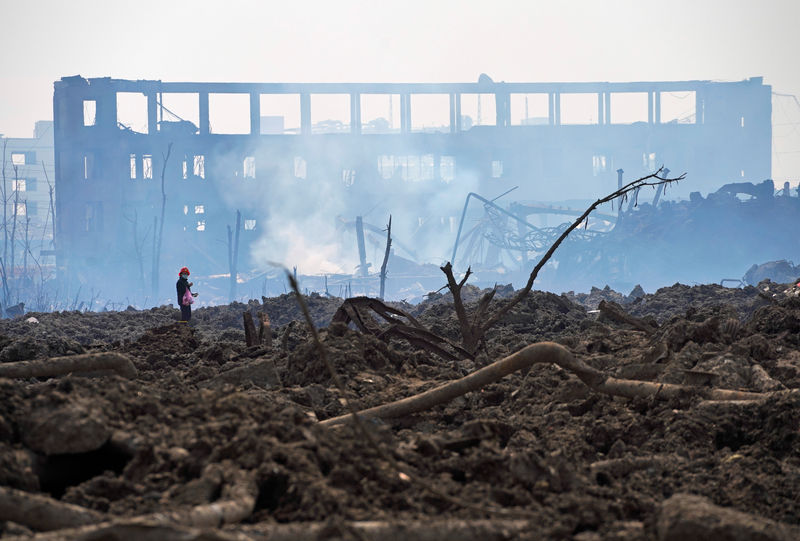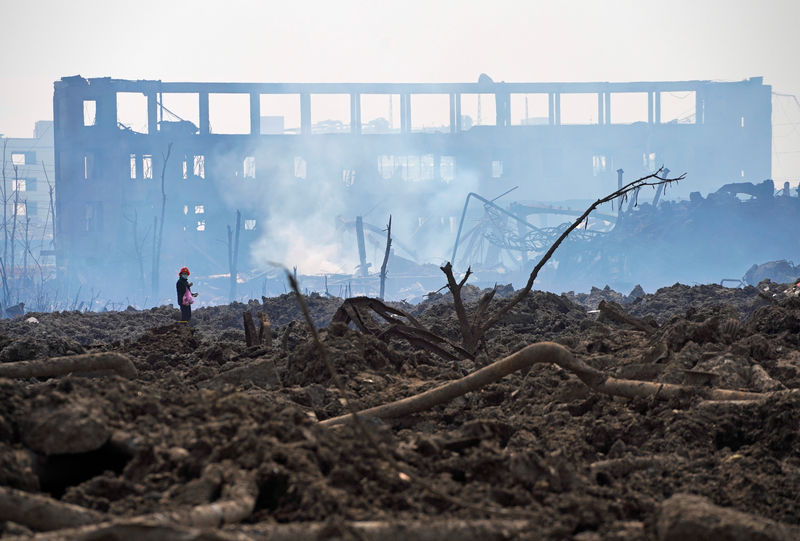 © Reuters. FILE PHOTO: A woman walks at the site at the pesticide plant owned by Tianjiayi Chemical following an explosion, in Xiangshui county
© Reuters. FILE PHOTO: A woman walks at the site at the pesticide plant owned by Tianjiayi Chemical following an explosion, in Xiangshui countyBy David Stanway
SHANGHAI (Reuters) – China has asked French utility Suez SA to help the country’s efforts to tackle underlying safety issues in its massive chemical sector after a deadly explosion in the eastern coastal city of Yancheng last month, a company executive said.
A pesticide plant blast on March 21 killed 78 people, caused severe structural damage in nearby residential buildings and forced authorities to seal off a river to protect local drinking water.
Authorities were in touch with Suez in the aftermath of the blast to discuss contamination risks at the site, and also to get involved in China’s long-term efforts to improve safety management, monitoring and transparency in the hazardous chemical sector, said Steve Clark, chief executive of Suez Asia.
“They contacted us, as well as other companies I’m sure, to see if we could help on some short-term issues, and to see if we are willing to get involved on a more strategic scale to make sure that these problems don’t happen again,” Clark told reporters.
“Our answer was obviously ‘yes’,” he said. “Quite frankly, we don’t want just to be the operator of plants. We want to be involved in strategic management as well.”
The environment ministry did not immediately respond to a request for comment from Reuters.
China is still investigating the causes of the blast, but 26 people have already been detained, including employees at the plant’s owner, the Tianjiayi Chemical Company. The firm has also been accused of violating safety guidelines in the past, state media has reported.
Authorities have already launched nationwide inspection campaigns into chemical production, fire safety and transportation, and widespread closures of small and unsafe plants are expected. The Xiangshui chemical park, where the blast occurred, will be shut down.
Suez already runs five hazardous waste treatment plants in China. Another is under construction and the company hopes to build around two new plants a year in the coming years.
One of Suez’s facilities at the Shanghai Chemical Industrial Park (SCIP) incinerates dangerous materials from 92 companies, including China’s Sinopec and Germany’s BASF and Evonik.
China has sought to close small-scale chemical producers and consolidate production in massive zones like SCIP, enabling safety and emission controls to be implemented and monitored more effectively.
“I’m sure that one of the outcomes of this incident is even more awareness that proper management of hazardous waste just has to happen,” said Clark. “We see this need growing more and more.”
Fusion Media or anyone involved with Fusion Media will not accept any liability for loss or damage as a result of reliance on the information including data, quotes, charts and buy/sell signals contained within this website. Please be fully informed regarding the risks and costs associated with trading the financial markets, it is one of the riskiest investment forms possible.

